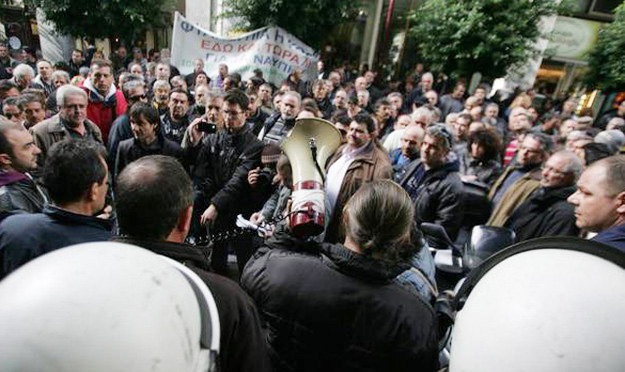GREEK seafarers along with dockers and all other ports workers staged a solid 24-hour national strike last Wednesday against two separate government Bills to further slash wages and privatise ports. Railway workers are also on 8-hour daily stoppages against privatisation.
Early on Wednesday morning, seafarers staged mass pickets in the port of Piraeus blocking access to the ferries; not a single ship sailed out of any Greek port.
In Athens, public transport trade unions’ leaders met to discuss their action against government plans.
The Athens Metro trade union SELMA president Antonis Stamatopoulos is being persecuted, charged with ‘traffic hindrances’ during the Metro workers’ strike last January.
If found guilty under a new law the Athens Metro company could sack him.
In the port of Piraeus seafarers, dockers and Commercial Navy Ministry workers held a demonstration outside the Ministry building demanding the withdrawal of the two Bills.
Later on in the day, leaders of dockers, port workers and seafarers trade unions held an important press conference where they announced that they have formed an alliance to co-ordinate the fight against the government’s Bills.
Ten trade unions were represented but no trade union leader of the Seafarers Federation was present. Also absent were two trade unions affiliated to PAME, the Greek Communist Party’s trade union section.
The president of the National Federation of Dockers and Port Workers (OMYLE), Yiorghos Yeorgakopoulos, said that the government Bill aims to ‘smash workers’ rights and privatise all ports’ and at the same time form a ‘new militarised Ministry for Commercial Navy’ as it was in the 1950s and 1960s following the Greek Civil War of 1946-49.
Yeorgakopoulos said that the day’s strike and mobilisations were but a ‘warning’ and stated that the unions will fight all the way against the government Bills.
Dimitris Gerles, representing Ministry workers, and Yiorghos Yoyos, representing Piraeus dockers, both emphasised that the Bills create a Ministry ‘of military structure’ where the managerial staff will be naval military officers.
Last February almost 1,000 Greek riot police and Greek navy special forces staged an early morning military-style raid against the striking seafarers while the government declared the strike illegal and placed all seafarers under the dictatorial law of ‘compulsory civilian mobilisation’ on the pretext of national security!
At the press conference, the president of the PEMEN (ferry crews) trade union, Antonis Dalakoyiorghos, said that the government want to ‘give over to big capital ports and services’.
Ship-owners, said Dalakoyiorghos, demand that crews manpower should be just 20 per cent of what is now; the other 80 per cent would be made of cheap labour.
‘This is what is happening right now in the Adriatic Sea ferries,’ Dalakoyiorghos pointed out.
He also said that ship-owners want to employ decades-old ferries and cut down drastically on autumn and winter sailings, thus isolating the Greek islands from the mainland.
The trade union leaders called on all ‘islands and city-ports communities’ to mobilise with seafarers and port workers against the government plans and Bills.
But they failed to link this fight with the all important current struggle of the Greek workers for the overthrow of the Accords of barbaric austerity measures and of the government imposed by the troika to carry out these measures. Nor did they speak of the necessity of an indefinite political general strike which will unite in action the Greek working class, youth and small business.
• In a press conference in Athens last Wednesday, the leader of the Opposition party Coalition of the Radical Left, Alexis Tsipras, said that there must be a stop to the catastrophe brought to Greece by the EC-IMF-ECB troika Accords and called for ‘resistance’ by the Greek people to ‘change the government’.
‘I repeat that the time has come, before Greece is made a desert country, that we must change our talk towards the overlords of the troika; for this the government must change as soon as possible,’ he said.
Tsipras called for a ‘left and radical’ government which will say ‘no’ to the troika. ‘We are ready,’ he said, ‘building the proper alliances in the European south’ to govern.
He said that for the ‘tragedy of Cyprus’, primarily responsible are those who say ‘yes’ in Greece to the troika, those ideologues of submission, and ‘those interests who seek a new economic order and a new order generally in Europe and throughout the world’ .
‘So when you ask us’, Tsipras pointed out, ‘which is our own advice to the Greek people in front of the troika’s representatives next visit, we say that now after what took place in Cyprus our advice is resistance, resistance, resistance.’
Tsipras refused to call for Greece to exit the euro and the European Union.
He said that ‘at once, those banks recapitalised must come under the state’s control and their management changed’.
Tsipras revealed that the meetings of the Greek Public Property Fund (the body set up for privatisations and sell-off of state properties) are conducted in English and he condemned the government for refusing his request for the minutes of the Fund’s meetings.
